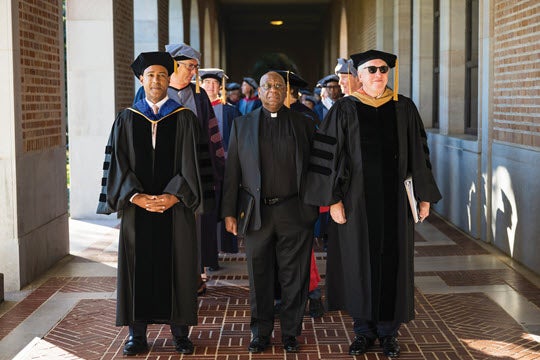
At 8:45 a.m. on Saturday, the sound of birdsong still predominated in the Academic Quadrangle as a few stragglers made their way to the appropriate assembly points for the investiture. As visitors arrived on campus, they would have noticed banners, commissioned for the inauguration and attached to the light posts along campus streets, celebrating President DesRoches and Rice’s values. Folding chairs were congregated on the eastern end of the Quadrangle, and the morning sun left much of the southern side of the seating in pleasant shade. Early arrivals strategically situated themselves there. The sky remained clear throughout the balmy morning, and sunhats and sunglasses proliferated; for others, the printed program served a similar purpose. An occasional gust of wind threatened to topple the residential college banners later in the morning. Two massive WaterMonster water stations, each with a capacity of 125 gallons, and plastic cups were situated on each side of the Quadrangle at the rear of the seating area. The platform for speakers, trustees, and selected guests stood in front of the Sallyport, with a canopy above the lectern and a large version of the academic seal on the front. Ramps, adorned with Boston ferns, led to the platform from each side along the platform’s front. A set of risers for musical performances stood north of the platform. Also on the northern side, an American Sign Language interpreter did her important work all morning to make the talks accessible. The events were streamed live, allowing anyone online to enjoy the occasion.
From its equivalent position just south of the main platform, the sounds of the Rice Symphonic Band warming up soon began to displace the birdsong. Boxes of programs were hurriedly unpacked at tables near the entry points for guests. The inauguration committee, the DesRocheses’ extended families, and various other guests of the board had an ample seating area immediately in front of the platform. A pleasant buzz of conversation sounded there as Reggie and Paula moved easily among them, greeting family, friends, and colleagues, awaiting the ceremony’s start.
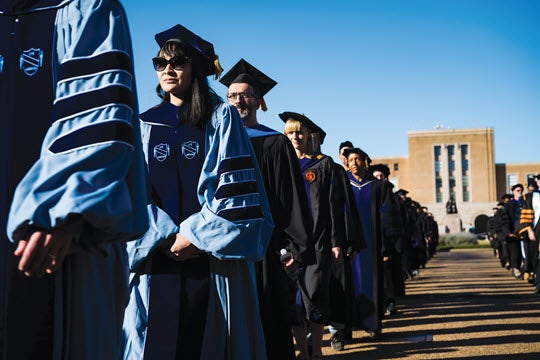
With the help of a dedicated team of marshals, the university’s various constituencies were assembling around campus: the trustees gathered in Humanities Building 117; the senior administration in Rayzor Hall 119; the visiting delegates in Martel Hall inside Duncan Hall; the color guard and the Rice faculty in Fondren Library; the undergraduate student representatives behind Baker College, and graduate student representatives in the Keck Hall Courtyard. At about 9:24 a.m., the Rice Symphonic Band, conducted by Charles Throckmorton, began a musical introduction, and those assembled for the processional prepared to march. At 9:34 a.m., the audience rose for the academic procession as the band struck up the march. First to proceed down the middle of the Quadrangle and past the Founder’s Memorial was the four-person color guard from Rice’s Naval ROTC program carrying the U.S. flag and the U.S. Navy flag, which were soon secured to the rear corners of the platform. The color guard was followed by Chief Marshal Fred Oswald, carrying the university mace. Following Oswald were Gabrielle Franklin, president, Student Association; Joshua Moore, president, Graduate Student Association; Toya Cirica Bell, president, Association of Rice Alumni; Korin Brody, chair, Staff Council; and Alexandra Kieffer, speaker, Faculty Senate. President DesRoches and the board of trustees and the platform party followed. Next came the faculty in their academic regalia in two lines, arranged by rank and seniority, followed by the robed delegates from other institutions of higher learning and from learned and professional societies. Finally, robed student representatives, first from graduate programs and then from each residential college, in order of the college’s founding, rounded out the procession. The processional ended at 9:53 a.m. as Chief Marshal Oswald placed the mace on its rest.
Chair Robert Ladd welcomed the audience on behalf of the trustees and the faculty, noting, “Our ceremony today incorporates traditions that began at the initial academic convocation in 1912.” Ladd introduced Reverend Rodney J. Armstrong, SSJ, pastor of Our Mother of Mercy Church, to give an invocation.
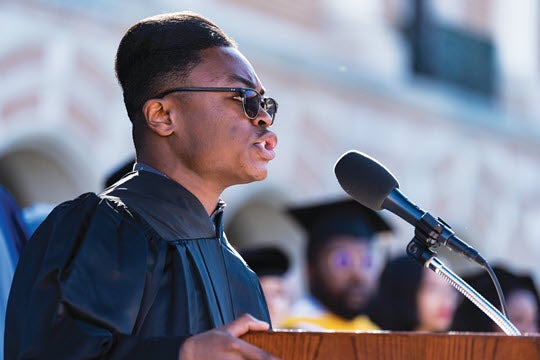
Let us bow our heads as we invoke the Almighty’s presence. We seek the Almighty’s blessings on all gathered here this morning: representatives of the Rice University Board of Trustees, alumni, dedicated administrators, faculty, staff, students, and friends. We particularly seek your blessing on President DesRoches and his family. Grant him an abundance of your spirit of wisdom and your gentleness. May he be gifted with the grace to always seek the greater good for the Rice University family. In your name, we pray. Amen.
Rev. Armstrong’s prayer was followed by an a cappella rendition of the national anthem from Antonio Domino, a graduate student in the Shepherd School. Dragon flies, accustomed to having the Quadrangle to themselves on Saturday mornings, darted low above the crowd as it stood in observance.
Returning to the lectern, Mr. Ladd recognized the importance of the occasion and welcomed special guests to enthusiastic applause:
Today, October 22, 2022, is a historic day at Rice University, as this ceremony marks an important and highly anticipated new chapter of Rice University. All of us—the board, faculty, students, staff, and administration—look forward to continuing and extending the achievements of the university under the leadership of Reginald DesRoches. We are dedicated to working with the president and his administration to fulfill Rice’s highest aspirations.
We are particularly pleased that distinguished representatives from more than 150 other universities and learned societies are here to help us celebrate this auspicious occasion. We extend a warm welcome to each of our guests and fellow celebrants. Thank you for joining us today.
I would like to recognize some special guests.
Elizabeth Gillis, here today representing her late husband, Malcolm Gillis, the sixth president of Rice University.
David Leebron, the seventh president of Rice University, and Y. Ping Sun, our former University Representative.
And Paula Gilmer DesRoches, who like her predecessors, will be an invaluable contributor to the health and welfare of this university.
It is our hope, and it is our expectation that the distinguished tradition of leadership that has been among Rice’s many blessings will be perpetuated in the forthcoming administration of Reginald DesRoches.
Mr. Ladd then introduced the five persons present to deliver greetings from the university’s constituencies to President DesRoches. Amid the applause following each set of remarks, the next speaker approached the lectern in turn.
Gabrielle Franklin, president of the Student Association, spoke first:
It is a great pleasure, President DesRoches, to bring you greetings and best wishes from the Rice Student Association. In your five years so far at Rice, you have not only shown us that engineers can build buildings, but that they can also build futures.
As president, we support your plans to develop Rice as an agent of change in the world through its contribution to knowledge. Every part of this university, especially students, need to be a part of creating a real difference in the world. Throughout our expansion to new horizons and beyond, we trust that you will guide us to remain true to what we are—a university that fosters an environment of respect, understanding, and growth for all students. We know that as president you will raise Rice to an institution that all of us can be proud to hail from regardless of where we come from, what we study here, and where we go next.
Most importantly, you continue to demonstrate to us what we can achieve. You’ve shown us that it’s possible to break barriers through the power of education, especially as we learn and progress here at Rice. Throughout your accomplishments and position as our first Black and international dean of engineering, provost, and now president, you are a champion and testament for us all in equity and inclusion here at Rice. We hope that as president you continue to increase the diversity, resources, and opportunities available to students here so that we can follow in the path you have forged toward success and accomplishment in our own endeavors.
I have no doubt that you will continue to lead Rice to a higher standard of excellence. I look forward to you bringing new horizons to Rice and building a space where we are only limited by our curiosity. You have the enthusiastic support of the student body and we are eager to assist you as you move forward with your ventures as our president.
Next was Joshua Moore, president of the Graduate Student Association:
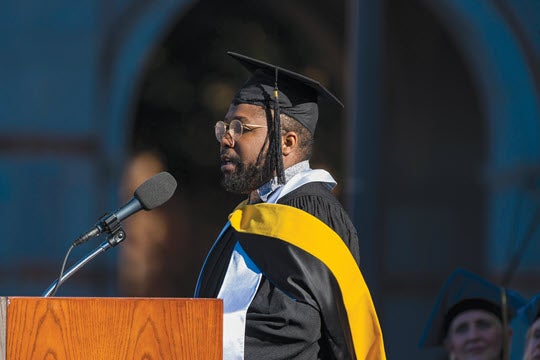
I would like to welcome all of our esteemed guest here today to celebrate a historic moment in the history of Rice. My name is Joshua Moore and I am the current president of the GSA and it is an honor to be here today.
As a graduate student interested in being in academia, I can say it is truly inspirational to see the career trajectory and commitment to students of President Reginald DesRoches. In my five years here at Rice, Reggie has created an atmosphere and presence that was welcoming to me as an URM [underrepresented minority] student pursuing graduate education and a career in higher education. His commitment to building support for students across campus continues the university’s commitment to student success inside and outside of the classroom. I could spend hours praising the outstanding accomplishments and contributions Reggie has made to campus. I look forward to seeing all the wonderful new ideas you will bring to campus. I can’t wait to see your vision for Rice as it enters this new chapter. Please join me in congratulating President Reginald DesRoches!
Toya Cirica Bell, president of the Association of Rice Alumni, followed Moore:
President DesRoches, as president of the Association of Rice Alumni it is my true honor to extend an exuberant welcome on behalf of the board of directors of the association and over 60,000 alumni around the world. As we walk with you through the Sallyport and beyond, please know that you have our loyalty, dedication, and felicitation as you usher in a new era of accomplishment, exceptionality, and inclusion at Rice University. As alumni, we support your vision and look forward to serving as ambassadors and emissaries, willing, able, and intentional in our efforts to invigorate and engage alumni through inclusive leadership. We will implement activities and initiatives focused on all facets of the alumni population, cross campus collaborations, diversity, equity, inclusion, and social justice, and continuous outreach and engagement with affinity and regional alumni groups.
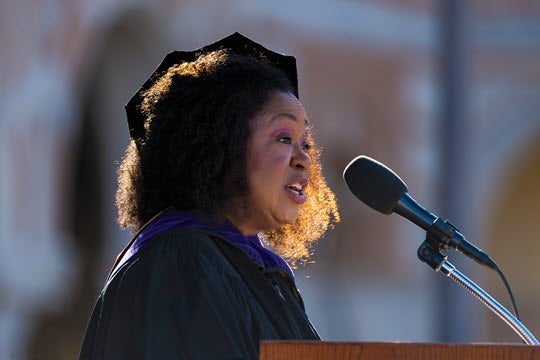
By your words and actions, we are assured that you will firmly establish Rice as a university with premier undergraduate and graduate programs elevating the sciences, research, and the humanities. We have a foundation and a legacy of achievement to expand upon and a future bound only by the stars to seize. As our university’s new president, I know that you will strive for the brightest and most distant star in these accomplishments and that you will include each among us in these shining efforts.
The members of the Association of Rice Alumni look forward to aligning ourselves and working closely with you, the administration, faculty, and staff to prepare students to be engaged alumni, and to invigorate engagement among the ever-growing community of undergraduate and graduate alumni globally.
As you embark upon the ideation and strategic planning process for the next era of exceptionalism for our university, it is my hope that you will entrust our alumni association with the opportunity to collaborate with you and your leadership team on designing a future that embraces all of our alumni—the undergraduate, the graduate, the continental, the international, the young and those more seasoned, the previously unrecognized, and those alumni to come.
Once again, congratulations to you President DesRoches, your lovely wife Paula Gilmer DesRoches, and your entire family on this momentous occasion, your investiture as the eighth president of Rice University. Best wishes for success and a joyful journey onward!
Korin Brody, chair of the Staff Council, brought greetings from the staff:
It is my distinct honor and sincere pleasure to congratulate Dr. DesRoches on your new position as the eighth president of Rice University.
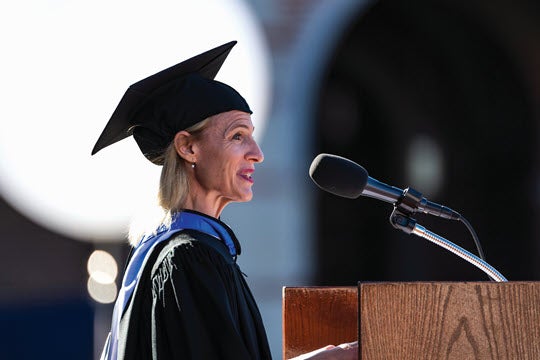
Our staff is comprised of nearly 3,000 individuals who serve in a wide variety of roles across campus in eight schools, and nearly 200 institutes, centers, research groups, departments, and programs. Whether we are at Rice to maintain our beautiful grounds, serve meals, provide medical treatment to students, coordinate alumni events, keep our campus safe, or offer academic excellence to the general public, we believe in the mission of Rice University and diligently work to uphold the values that make this great institution what it is.
As a staff, we are fiercely committed to helping advance and achieve the collective goals of our individual work units and the university as a whole. We are the mortar, the pathways, and the cornerstones to facilitate meaningful support in preparing for matriculation, through education, and beyond graduation. There is no upper limit to our dedication in our shared endeavors.
In these noble pursuits, we look to you and your administration to not only maintain the excellence built over more than a century but to expand upon it in the decades ahead. We trust that you will embrace and nurture the extraordinary talents and dedication our staff demonstrates every day. We have faith that you will uphold important initiatives, making noteworthy and novel progress in access, diversity, inclusion, and equity for staff, students, and faculty alike. We look forward to working closely together and know you will work tirelessly to uphold the deepest respect and appreciation for our service, knowing that we, without reservation and with unmatched enthusiasm, will do the same for you.
On behalf of the devoted and capable staff at Rice University, we offer you and your entire family a heartfelt congratulations for your new role in our special community.
Finally, Alexandra Kieffer, speaker of the Faculty Senate, offered the faculty’s congratulations and welcome:
I am honored to be here as speaker of the Faculty Senate and as the representative of the faculty of Rice University at this joyous occasion in honor of our eighth President, Reginald DesRoches. Created in its current form in 2005 under the leadership of our seventh president, David Leebron, Rice’s Faculty Senate, along with a collection of standing university committees, is the means through which faculty governance is exercised and through which the faculty, together with the president, the provost, and the board of trustees, participate in the shared governance structure of the university. Our Faculty Senate is thus premised on the idea that the contribution of the faculty to the university does not only lie in our own specific research agendas, the courses that we teach, and the dissertations we advise; rather, by bringing together the breadth of faculty expertise in a single deliberative body—though such deliberation may, admittedly, be contentious at times—faculty governance strengthens the university and clarifies its vision; it puts the faculty in partnership with the president and his administration, to further our common purpose in the pursuit and perpetuation of knowledge.
President DesRoches, the faculty are eager to begin this new chapter in the life of the university in partnership with you. Drawing from the wide range of our scholarly endeavors and our classroom experience, we look forward to imagining with you the possibilities for our collective future as a university, even as we acknowledge our rootedness in the intellectual traditions that constitute our collective past. As the university cultivates new opportunities and confronts new challenges, we are optimistic about what awaits us. We welcome you, we welcome your leadership, and we look forward to realizing with you our shared future at Rice.
The Rice Chorale, which includes a variety of students and staff, filed in from the north and filled the risers provided. With accompaniment by the Shepherd School of Music Brass Ensemble and conducted by Thomas Jaber, the chorale sang “Alleluia,” by Randall Thompson, to the crowd’s considerable pleasure.
Ruth J. Simmons, president of Prairie View A&M University, next delivered an inspiring talk offering her advice to Rice and to President DesRoches, whose name she pronounced with the flair of a scholar of French language and literature. Mr. Ladd introduced her with a reminder of her service both to Rice and to higher education more broadly:
Now it is my pleasure to introduce our keynote speaker, a friend and advisor to me and to so many others here today, Dr. Ruth Simmons.
Dr. Simmons, the current president of Prairie View A&M University and a Rice trustee emerita, is highly regarded as one of the leading voices in higher education.
Prior to serving as president of Prairie View A&M, she was president of Brown University for more than a decade, significantly improving its standing as a globally renowned research university.
Prior to Brown, she was president of Smith College, where she launched several academic initiatives, including the first engineering program at an American women’s college.
A French professor before embarking on her storied career as an administrator, she also has held faculty appointments in comparative literature and Africana studies. She earned her Ph.D. in Romance languages and literatures at Harvard University.
Among her many outstanding accolades, she is a fellow of the American Academy of Arts and Sciences, the American Philosophical Society, and the Council on Foreign Relations. She serves on several boards, including the Houston Museum of Fine Arts, and has received numerous accolades, including, in 2012, being named a “Chevalier” of the French Legion of Honor.
Please welcome Dr. Ruth Simmons.
President Simmons began her twenty-minute presentation at about 10:20 a.m. as the audience gave their rapt attention:
Chair of the Board Ladd, esteemed trustees, faculty, staff, students, and alumni, good morning. As a former Rice University trustee, I was delighted to be asked to participate in this transition of leadership—one of the most important in the university’s history. Of course, any transition in leadership at an institution of Rice University’s stature can be said to be an important moment but the coincidence of this transition with the state of our national life today makes this occasion exceedingly more meaningful. By anointing Reginald DesRoches as its president, Rice is vaulted into a position of national leadership not simply of universities but also of a nation in need of leaders who possess the cultural competence to heal rather than divide. The nation is calling for leadership and this university has answered.
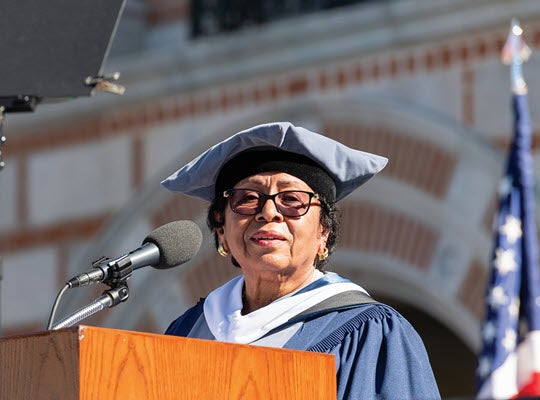
To be sure, Rice has an acknowledged tradition of excellent leadership. It could not have become the paragon of scholarship that it is today without the forward-looking leadership provided by the board of trustees, visionary presidents, capable administrators, a prize winning and innovative faculty and a governance structure that allows for a variety of inputs, including from students and alumni. Many marvel at or spurn university governance structures where so many feel empowered and are included as stakeholders. But such a structure makes sense when one’s domain is knowledge creation and transfer, for how can we trust knowledge production that is closed to important insights and tests? If we are prepared to eschew the importance of so many participating in the effort to improve on what is known, we might as well confess our comfort with fallacies such as the notion that the earth is flat.
The input of knowledge over time from many perspectives delivers extraordinary benefits. That is why, as we anoint a new leader, we must be careful to build on the existing strength of the institution for that strength has been tested over time and, to borrow from materials science, we know that tensile testing is fundamental to the avoidance of failure. The greatest universities have learned this well; building on well-tested platforms is a good bit sounder than tearing everything down in deference to what is merely new and shiny. President Leebron, with whom I proudly served as a Rice Trustee, brought to this university a vision of expanded possibilities. Building upon what his predecessor had done, he led the university’s advancement to an enviable place in the diadem of higher education. As president of the Association of American Universities, he brought added recognition to the university. At the same time, his expanded vision of Rice’s place in this community, the nation and the world acknowledged the university’s civic responsibility in a rapidly changing social context. It is not easy for institutions to move gracefully beyond histories that pose challenges to a more modern vision and narrative, but Rice took that on and is creating a unique path to that reckoning.
For any president assuming the mantle of authority over a major international university, this should be a moment to acknowledge their entitlement to this leadership role in view of their stellar character and past accomplishments. In that regard, there is much to cite and laud in regards to the path that Reginald DesRoches has traveled to arrive at this ceremony today. A brilliant student at UC Berkeley, an Early Career award winner as a faculty member, a member of the National Academy of Engineering, the winner of many professional prizes and honors, and a breathtaking ascension through the academic and administrative ranks of Georgia Tech and Rice prove amply that he is well qualified to lead a major university. Not all universities being the same, what can we say about the unique match between his extraordinary profile and the needs of the university in this moment?
We must begin with the legacy of the university’s founding. William Marsh Rice, who bequeathed much of his fortune to the establishment of this university, was in most respects a man of his times. On the one hand, he was impelled to dedicate a significant portion of his wealth to an extraordinary cause: the creation of an institute for the advancement of literature, science and art. In what must have been an extraordinary reach at the time given Houston’s profile, he foresaw the need for access to a broad education. At the same time, the limitations of his background and socialization led him to specify that this largesse was destined for whites only. While we may speak today of the apparent dichotomy of perspectives embedded in these two acts, at the time of Rice’s decision, such decisions would hardly have seemed so to most. Rice’s act was as ordinary as the racism and discrimination that gripped the country in 1882. Few would have predicted that the admission requirement “for whites only” would hang so disparagingly over the fate of Rice for generations until the terms of the will could be overturned. Rice admitted its first Black student in 1964, the year after I graduated from a Houston high school.
Given this historical context, what does it mean to have a person of President DesRoches’ race and background assume responsibility to carry on the legacy of William Marsh Rice’s vision? It means everything. First, his appointment proves once again that, whatever the limitations of our vision in our time, future generations can never be permanently bound by them. Further, that President DesRoches is called to lead William Marsh Rice’s university speaks powerfully to the strength of Rice’s idea that in knowledge lies wisdom and personal growth and the opportunity for society to advance. Both Houston and Rice University have advanced because of the knowledge afforded by thoughtful engagement with learning. Where would Houston be today without Rice and where would Rice be today without the decision to undo the racial terms imposed by its bequestor?
At the same time, let us be careful of a narrative that overstates the racial implications of today’s ceremony for that is only part of the story. President DesRoches will not and must not be given a pass because of William Marsh Rice’s error. He must be a president in full, judged not on the basis of his race and the difficulty he faces as part of this legacy, but on the basis of his ability to lead this community forward in a powerful, visionary and unifying manner. I can almost guarantee that few days will pass when he does not reflect upon the irony of a person of his background carrying on the Rice legacy. I know this because while serving as president of Brown University which was associated with one of the most infamous slavers of the colonial era, I pondered incessantly how to lead in the context of that history. I discovered that keeping that history before me inspired me every day to be a better president. However, that history was never my principal guide in terms of what I needed to do as Brown’s president.
President DesRoches, William Marsh Rice’s story is not the end of the university’s story and it is not the centerpiece of your story. By stepping into this role, you have the opportunity to create a new narrative for this amazing university. One that will resound through the ages.
Do not be overwhelmed by the fact that you have been entrusted with the future of a long enduring institution with tens of thousands of graduates who look to their institution as a beacon and bellwether for the rest of their days. With the intensity of that attention and the expectations of students, faculty, staff, civic leaders, and so many others, this responsibility comes with a heavier burden than William Marsh Rice’s legacy. I urge you not to concern yourself with the myriad opinions, criticisms, and plaudits that will come your way. Look first to who you are, what you owe yourself, and where you have come from. For it is enough, I think, to be chosen for such a role because of your intellectual prowess, past success, national stature, and personal journey. Work hard at being yourself in the fullness of your knowledge and experience, following in the path that has led you to this day and relishing in the opportunity to do good for a community that you love and are committed to serve.
Reginald DesRoches is a man for this moment in history. Much will be written about him and William Marsh Rice and the meaning of his presidency. Imbued with the meaningfulness of his background in Haiti, formed in the context of the magnificent and inevitable march of justice, attentive to the opportunity to make a difference for others, he must define this moment in a way that suits him. I pray that all who honor this university will give him room to do that on his own terms.
Congratulations, Reginald. I wish you Godspeed as you lead this great university to new heights.
At 10:40 a.m., Chair Ladd began the investiture itself, in which the new president is formally invested with the symbols of the office.
Reginald DesRoches, you have accepted the summons of the board of trustees to serve as Rice’s eighth president—indeed, only the eighth president in the university’s 110-year history. Even in our most humble beginnings, before the first cornerstone was laid upon this modest farmland on South Main and our city became the diverse and global city it is today, the founding vision for this university was about excellence, or as our founding president Edgar Odell Lovett proclaimed, “placing no upper limit on our endeavors.” For more than a century, we have strived for the highest achievement in the pursuit of knowledge, service to our community, and contributions to humanity.
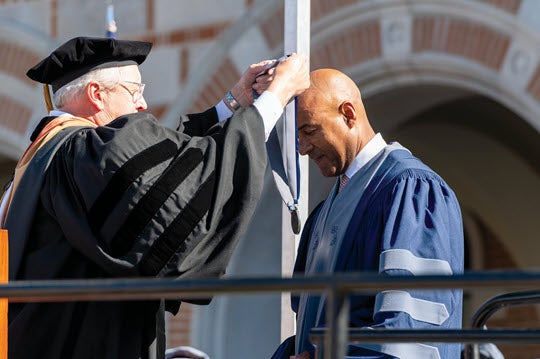
Today, we continue to be inspired by this extraordinary purpose, strengthened by our friendships here and around the world, and compelled to chart a better future through education, research and service. When we began the search for our new president over a year ago, we knew this was a transformational moment in our history, when Rice is poised for even greater stature and recognition. Building on the remarkable gains of our predecessors, we needed a president who possessed the vision, ambition, integrity, and intellect to move us ever forward.
Reginald DesRoches, you are that president.
Born in Haiti on the island of Hispaniola, raised in Queens, New York, educated with distinction at the University of California at Berkeley, rising to prominence at Georgia Tech University in Atlanta, Georgia, before serving as dean of engineering and then as provost of Rice University, your life is an example for all of us as to what is possible in America.
As an outstanding civil engineer and member of the National Academy of Engineering, your expertise on infrastructure systems and seismology has helped mitigate natural disasters and other extreme conditions.
As former dean of Rice’s School of Engineering, your devotion to faculty and students, enthusiasm for building community, and wise leadership increased the size, visibility, and international prestige of its programs.
As provost of Rice University, you amplified the breadth and depth of our research endeavors, prioritized the diversity of Rice’s faculty and student population, and sustained the university through the challenges of a global pandemic.
In each of these roles, your personal attributes shined through—an ability to listen and connect, to be authentic in action, to build trust, and lead by example. With a devotion to family and passion for service, you have, as I have observed, lived an exemplary life.
As you begin the next chapter in Rice’s history, we pledge our support to you. With your leadership and the dedication of faculty, students, staff, alumni, parents, and friends, we will strive to realize the aspirations of this great university.
And now, on behalf of the Rice Board of Trustees, it is my privilege to carry out the formal investiture of our new president, at which time we will present Reginald DesRoches with two symbols of the office of president of Rice University: the Rice robe and the presidential medal.
The academic robe is a tradition dating back centuries to the earliest universities, signifying the timeless principles and enduring legacy of learning, knowledge, and service. Today, the robe serves as a symbolic reminder of our values and the solemn duties to teach, discover, create, and chart a better future.
Faculty Senate Speaker Alexandra Kieffer handed the presidential robe to Mr. Ladd, who then helped President DesRoches put it on. Mr. Ladd then presented the presidential medal made for the occasion.
Now, it is my greatest honor to inaugurate you, Reginald DesRoches, as president of the university and to confer the authority, powers, and privileges of that position to you. As a visible symbol of your investiture, I hereby present you with the presidential medal.
A standing ovation was immediately followed by the beginning of the newly invested president’s address:
Thank you, Rob.
Let me first take this opportunity to thank Ruth Simmons for her inspiring and thoughtful remarks.
Ruth, when the history books are written, you will go down as one of the most transformational higher education leaders of our time. You serve as a mentor to dozens of leaders across the country, and most importantly, throughout your career, you have been a steadfast advocate for underserved communities in higher education. Thank you for being a dear friend and mentor. You always have found time whenever I needed your advice. Houston is proud to call you one of our own.
Distinguished and welcome guests, a heartfelt thank you for being here. I am truly honored. And I am humbled. For as I look around, what I see is excellence. I see excellence in what surrounds us—the magnificence of these grounds, the elevated architecture, and our many donors who have given so generously to Rice over the years to make this possible. I see excellence in the spirit of our alumni who have walked these paths leading us to greater knowledge and whose achievements in life reflect the quality of a Rice education. I also see excellence in what surrounds these hedges and the opportunities that are afforded us as an integral part of one of the world’s most dynamic cities. Finally, and most importantly, I see excellence in the making, thanks to our incredible faculty, staff, and the students we serve.
Before getting into where we are heading as an institution and what it will take to get there, I’d first like to take a moment to extend my gratitude to the many people who have paved my way to this podium.
First, I want to acknowledge David Leebron, along with his wife Ping Sun. David’s vision to push Rice outside the hedges has forever changed our university. His work to enhance the diversity and culture of inclusivity here has paved the way to a more equitable future for all of us. On a personal note, his trust in hiring me five years ago, first as the dean of engineering and, more recently, as provost during one of the most challenging times in our university’s history, allowed me to grow in new, sometimes unexpected ways. Thank you, David, for all you have done for this university and our community. We will build on your many accomplishments.
I would like to thank members of the board of trustees, past and present, for entrusting me with the honor of serving this institution. I am grateful for the incredible service you provide to Rice and the support you already have given me during my brief time as president. I want to specifically acknowledge Charles Duncan, whose passing this week reminds us of the invaluable contributions our trustees make to our university.
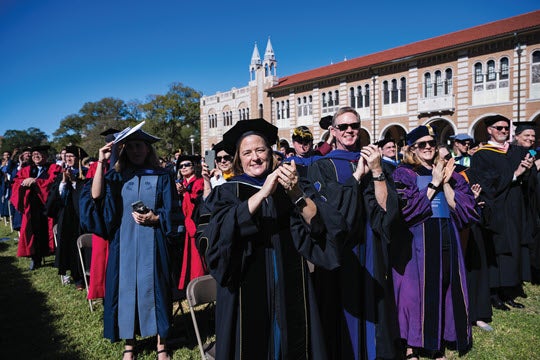
I would like to recognize our provost, Amy Dittmar, our vice presidents, vice provosts, deans, center and institute directors, and faculty for carrying out the important mission of our university. Let me also acknowledge the entire staff of Rice who keep this place running so seamlessly and, specifically, our senior administrative staff with whom I’ve worked closely. We are on this journey together and I am grateful for your service and contributions.
I am really pleased to see so many students in the audience. Having you sit alongside many of our alumni, faculty, staff, community members, and supporters provides a full accounting of what it truly means to be part of this incredible Rice family. To my current and former students, I want you to know that I have learned as much from you as you have from me.
Thank you to the many people from the city of Houston, local industry leaders, and members of the Texas Medical Center. I look forward to continuing to partner with you.
I’d also like to quickly mention a few others who have helped me achieve my dreams. A special thank you to my Georgia Tech family where I spent eighteen years prior to coming to Rice. I want to specifically acknowledge John and Karen Huff, Mike and Jenny Messner, Howard Tellepsen, Fort and Beth Flowers, Dick Bergmark, and my dear friend Larry Jacobs and his wife Kim.
Throughout my career, three mentors have had a profound impact on my development as a leader—Greg Fenves, president of Emory University, who took a chance on me as a new Ph.D. student 33 years ago; Gary May, chancellor of UC Davis, who has served as a role model for generations of young Black and brown students and faculty in STEM; and Ruth Simmons, who I consider the gold standard for university leadership. Greg, Gary, and Ruth, for all that you have taught me, for all of the time you have given me and for all of the support in me you have shown, thank you.
And to my own family. My three wonderful children, Andrew, Jacob, and Shelby. You taught me about unconditional love, and yes, at times, patience. I am beyond proud of the young adults you have become and of the values of kindness and gratitude you display on a daily basis.
Paula, my wonderful wife, has been on this journey with me since I was a student at UC Berkeley. My No. 1 fan, she has been by my side through both successes and setbacks. She is a brilliant, accomplished health care professional who I credit for raising our children while working full time. She is one of the most caring and loving people I know and, as you get to know her, you will understand why I am her No. 1 fan and how important she is to any success I have. All my love and gratitude, Paula.
To my siblings, Lionel, Maggie, and Pascal, let me take this opportunity to publicly apologize for being such a difficult little brother as a child. As my second set of parents when Mom and Dad were working, you were always there to protect me and stand up for me.
You were my guardians and my inspiration.
None of my accomplishments would have been possible without the sacrifices of my parents. They left Haiti in the late 1960s for the U.S., solely to provide their children the opportunity for a better life. My mom worked two shifts for over 30 years while also making sure the family was fed, the house was clean, and we were ready for school the next day. My dad worked his entire career with one company, also working odd jobs on weekends. They did all of this so that their children could have educational opportunities and a life very different from theirs. As a result, I stand here today as president of Rice. Lionel is a physician in New York, Maggie is an attorney in New York, and Pascal is the CFO of AT&T and is now a Texan like me.
Our mom died 11 years ago, but our dad, who recently turned 90, joins us here today in the audience. Thank you, Dad, for all that you have done for us.
I am often asked why I left Georgia Tech to come to Rice as dean of engineering in 2017. I was at a very exciting point in my career, leading one of the top civil and environmental engineering programs in the world. Well, after eighteen years in Atlanta, I could no longer take the heat and humidity, so I thought Houston would be a great break.
Seriously, I came to Rice because of its reputation as a truly outstanding university, and what I believed, and still believe, is the potential to be among the premier full-spectrum research universities in the world, with a continued commitment to a broad-based liberal arts undergraduate education.
I believe this is achievable even more today given our exceptionally talented and committed students, staff, and faculty, the progress we have made on a number of fronts in the past several years, the support of a dynamic and exciting city, and a loyal alumni base.
I deeply believe in the mission of universities. Universities are places that can transform lives, just like mine. To come from a working-class community as a first-generation college graduate, to attending and then teaching at some of the best universities in the world, and now being entrusted to lead this great institution, is a powerful statement about the importance and relevance of universities in today’s society as places of opportunity and advancement.
As Nelson Mandela so eloquently put it, “Education is the most powerful weapon which you can use to change the world.”
I believe it is also the most powerful weapon to change lives. We will keep this central in our minds as we develop our vision for the university.
My appointment here has been characterized in the media as historic in that I am the first Black individual, first immigrant, and first engineer to become president of Rice. And while those are distinguishing characteristics of which I am very proud, they are not what define me. In fact, what defines me are those same attributes that I see in every student, every staff member, and every faculty member, and alum. These are: hard work, perseverance, humility, gratitude, and respect for others.
But there are other values that I hope define me, and that I share with those who walk with me on these sidewalks every day. These values are curiosity and courage—grounded in nothing less than excellence in all we do. I believe these values are instrumental in our trajectory of recognition as a premier university on a global scale. These are values that we will keep near and dear to us as we embark on this journey.
Curiosity is intertwined in the very definition of why we are here. As students and academics, we seek and advance knowledge to expand frontiers. Creativity is what we nurture and what makes it possible to do extraordinary things. We research new solutions with the goal of transforming ideas into action so that, as one of my predecessors, George Rupp, stated, “We can make contributions to broaden society.”
Curiosity is at the very core of why we as a university exist. That will not change as we move forward.
We must commit to excellence in all we endeavor at Rice University. Any undertaking we attempt must require our very best effort. Whether it is a research challenge, a critical question in the creative arts, an athletic competition or how we function as an organization, we need to strive to be the very best—we must strive for excellence. Striving for excellence takes diligence and intentionality.
As Aristotle wrote, “We are what we repeatedly do. Excellence, therefore, is not an act but a habit.” We must remain committed to making excellence an ingrained habit that we repeat, over and over and over again.
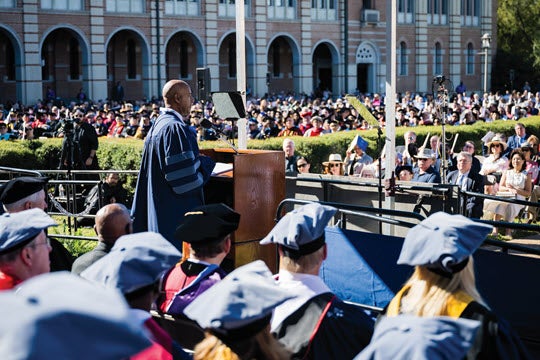
Rice University is at an inflection point in a new era of change—change that, like never before, demands courage. Former President Gillis characterized Rice as “a place for ideas, for free and vigorous discussion of ideas.” It is also a place where we need to think BIG, and go beyond our comfort zone. And that, my friends, is why we need courage.
As we move forward, we must value and commit to the courage of our convictions. The courage to grow and the courage to evolve. The courage to explore new territories and to take risks. The courage to stand up for what is right and just. And the courage to make hard decisions that may not be popular or easy but are necessary to realize our ambitions.
It is not lost on me that 60 years ago on this very campus, President Kennedy in announcing the country’s intent to go the moon said, “We choose to go to the moon in this decade and do the other things not because they are easy, but because they are hard, because that goal will serve to organize and measure the best of our energies and skills.”
During the past few months, I’ve met with countless students, alumni, faculty, staff, donors, civic leaders, and others to help me understand how to courageously evolve this university. Where we are headed is not my singular vision, but based on what I know from my own experience at Rice as a former dean and provost combined with conversations with numerous members of the Rice community.
While still evolving, our direction is clear.
In the coming years, Rice will significantly increase its visibility and impact as a premier research university. We will have graduate programs of the same distinction as our undergraduate programs, all while strengthening what Rice is well known for—an unparalleled undergraduate education. This university will be grounded in all we do by the values of diversity, equity and inclusion, a place known for its culture of care, tolerance, and understanding.
The foundation has already been laid. This journey has begun. We only need the creativity and courage we hold in our hearts—and an unwavering commitment to excellence—to take Rice to the next level.
The original vision of our founders was that this institution would be a full-range university with undergraduate, graduate, and professional schools. Dr. Edgar Odell Lovett, our first president, had bold ambitions for Rice as a premier research university, noting that “faculty must be involved in research because the best person to lead the learner from the unknown to the known is the individual who is continually leading themselves from the unknown to the known.” He further stated that “the privileges of research are necessarily related to the pleasures of learning.”
It is in this vein that we recommit ourselves to the importance of research, scholarship, innovation, and creative works in transforming our city and the world, and in the process, our institution.
When a cure for some of the most pressing neurological diseases, like Alzheimer’s, is found, it will be our engineers and scientists working with the clinicians in the Texas Medical Center who unlock the mysteries of the brain—all while working with our social and behavioral scholars to ensure that these cures are used for good for all.
Rice will be central in developing knowledge, materials, technologies, business models, and policies, working with industry leaders to accelerate the world’s transition to clean energy. Our research and scholarship will help solve the most pressing global environmental challenges facing the human race, while working to ensure that all communities share the benefits equally.
Rice will continue to partner with our great city while we study and provide solutions for how Houston, the most diverse city in the country, can continue to grow and prosper in a resilient and equitable manner where all citizens have access to proper health care, education, and housing. Our research on inclusive prosperity will be a model for other cities around the world.
Furthermore, Rice will recommit to the importance of the arts and humanities as a foundation for higher learning, and a means for addressing today’s most pressing challenges.
The arts and humanities expose the complex and diverse world around us, making us more aware of our place in society. The arts inspire us to create and challenge our beliefs, and to connect with people from different places and cultures on a deep, emotional level. The humanities and the arts build empathy, which is perhaps the most important skill set needed to solve many of the challenges facing us today.
To accomplish our goals, we must look to the foundation of any great university, which is its faculty. We will hire the best academics, and have the courage to settle for nothing less than excellence as we hire more than 200 faculty across the breadth of the university in the next five years. In addition to excellence in their fields, they will bring an unbridled curiosity and a collaborative spirit to the university, and add to the diversity of our great institution.
Recruiting excellence has been the foundation of our university since its founding in 1912 and we will continue to recruit transformational scholars—scholars like Kiese Laymon, who just two weeks ago was awarded a MacArthur “genius” fellowship, and who joined our School of Humanities this summer.
We will invest in our infrastructure—in terms of people, physical space, and technologies—to ensure an alignment with our ambitions in research, scholarship, and creative work. Facilities that match the excellence and talent of the people using them, such as the opera house, the Ralph O’Connor Building for Engineering and Science, and the William T. Cannady Architecture Hall—will continue to be added to our campus.
And we will support our graduate students and programs so that they can achieve the same level of distinction as our undergraduate programs. Bob Curl, our Nobel Prize recipient in chemistry who passed away earlier this year, would often note that his accomplishments that led to his 1996 Nobel Prize would not have been possible without the exceptional graduate students who worked tirelessly in his lab.
Importantly, we will make what I believe is the best undergraduate education in the country even better.
We will reimagine our general education curriculum for the first time in nearly 20 years, to ensure that our students are prepared to solve the problems of the future with training that combines analytical thinking with a deep understanding of history, policy, and culture. We will continue to add new undergraduate majors and minors that align with student interests and global challenges, like our recently launched undergraduate business major and our new minor in environmental studies.
We will enhance opportunities for study abroad by pursuing new global relationships, including newly established partnerships in France, India, Scotland, and Latin America. And we will continue to offer degrees and continuing education programs tailored to our community’s needs both inside and outside the hedges.
Innovation and leadership will be core tenets for our students. Our Ion innovation district and our new Office of Innovation are taking shape. Collaborations will ensure that our students have the skills and partnerships to create technologies and tools to transform our city and the world.
As we recommit to research, scholarship, and creative works, we do this within the framework of diversity and inclusion that runs parallel to our own unique culture of tolerance, civility, and open dialogue. This is possible because our student body is a multicultural reflection of the world. Our Class of 2026 has no single ethnic or racial majority, with 32% coming from underrepresented minority groups.
And I’m not just talking about demographics. The strength of our student population is in its array and depth of interests, talent, athletic abilities, leadership skills, and personalities to create our unique culture. The diversity of our students and the breadth of support they receive at Rice are some of our greatest assets. Diversity at Rice is not just tolerated, it is celebrated as a strength of this great institution.
In complex times such as these, student support, including health and mental well-being services, and safety and security initiatives, will be reinforced to uphold our exceptional sense of family and belonging. So will our residential college system, which supports students intellectually, emotionally, and culturally through social events, intramural sports, student plays, lectures series, courses, and student government. In essence, Rice’s residential college system provides a community within a community, or perhaps more appropriately, a family within a family.
I am an engineer, someone who solves problems. But Rice is not by any means a problem to be solved. Engineers build things—small and large—and engineers make things better, stronger, and more efficient. As president, I have been given the opportunity to build a stronger university starting with the firm foundation Rice has today. Presidents, like engineers, do not do their work alone. I will need the help of all of you—your ideas, your support, your hard work, and your dedication as we build a better university that helps build a better world.
Is our road map for the future ambitious? Of course. Can Rice significantly increase its visibility and impact as a premier research university? For sure. Can we create new tools, technologies and ways of thinking that fundamentally change the world? Yes. Can we have graduate programs of the same distinction as our undergraduate programs while strengthening our unmatched undergraduate education? Absolutely.
It will require us to have the courage to take risks, the courage to push the envelope, the courage to make tough decisions, and the courage to change.
Yes, we will change. But while our ambitions require us to evolve, there is one thing that cannot change, and that is the unique culture of care we have at Rice. The way we treat people with respect and dignity is paramount.
I am reminded of one of my favorite quotes from Maya Angelou on leadership and dealing with people. She said, “I’ve learned that people will forget what you said, people will forget what you did, but people will never forget how you made them feel.”
We must remain a place where people never forget that at Rice they felt loved, welcomed, and special as they received an unequaled education that enabled them to transform their own lives and the world around them.
For at this university, we are dedicated to “no upper limits.” This is a place where the greatest problems of the world can and will be solved. It is in our DNA to go beyond the cusp of greatness to greatness itself. And, in John F. Kennedy’s words, we will “move forward with strength and courage.”
Thank you all for being here today. I am truly honored and excited to serve as the next president of this incredible institution.
President DesRoches finished his stirring remarks to a standing ovation at 11:08 a.m., and the investiture fanfare titled “New Dawn” soon followed. Composed for this occasion by Alex Moreno-Gonzalez, an undergraduate in the Shepherd School, it was performed by the Shepherd School of Music Brass Ensemble from the northern side of the platform. The rousing fanfare lasted three minutes, and the recessional from the Rice Symphonic Band promptly followed just before 11:15 a.m.
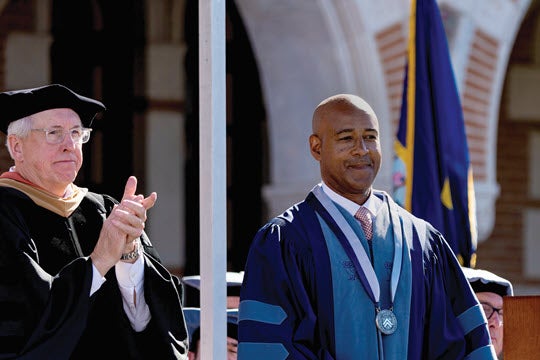
With the recessional still echoing on the Academic Quadrangle, and the platform party leading the way back past the Founder’s Memorial toward Fondren Library, a different sound filled the foyer of the Humanities Building—the sound of popping corks. After Cynthia Wilson, deputy secretary for the board of trustees, helped President DesRoches and the trustees stow their formal robes in Humanities 117, glasses of Perrier-Jouët Champagne were handed out there for a private toast to mark the occasion. Gloria Tarpley and Elle Anderson, who co-chaired the inauguration committee, made comments. Ms. Tarpley addressed Reggie and Paula: “We wanted to share with you how proud and happy we are to see this day come. It was unforgettable; the speech was inspirational; and we are so grateful to have you here as our president. Elle and I have thoroughly enjoyed working towards this, and the one common thread we heard from every constituency was the emotion, and the thrill, and the happiness at having you take over as president. So we are just very happy to join in that.” Ms. Anderson recalled how happy she was to meet the DesRocheses when he arrived as a dean five years earlier, explaining that “it resonated over and over with everyone that you meet just how humble and wonderful you are. You treat everyone the same, and that is what we strive to do at our university. We are so proud to have you as our leaders.” Co-chairs Tarpley and Anderson presented a tie adorned with owls to President DesRoches and an owl-themed Hermès scarf to Paula, and glasses were raised in an atmosphere of good will that brought to an end the day’s dignified ceremony to mark this historic moment in the university’s long history.
The Official Summons Celebrations of Community, Community Celebrations
